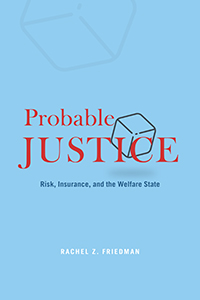Probable justice
risk, insurance, and the welfare state
- ISBN: 9780226730936
- Editorial: University of Chicago Press
- Fecha de la edición: 2020
- Lugar de la edición: Chicago. Estados Unidos de Norteamérica
- Encuadernación: Rústica
- Medidas: 23 cm
- Nº Pág.: 254
- Idiomas: Inglés

Decades into its existence as a foundational aspect of modern political and economic life, the welfare state has become a political cudgel, used to assign blame for ballooning national debt and tout the need for personal responsibility. At the same time, it affects nearly every citizen and permeates daily life—in the form of pension, disability, and unemployment benefits, healthcare and parental leave policies, and more. At the core of that disjunction is the question of how we as a society decide who should get what benefits—and how much we are willing to pay to do so.
Probable Justice? traces a history of social insurance from the eighteenth century to today, from the earliest ideas of social accountability through the advanced welfare state of collective responsibility and risk. At the heart of Rachel Z. Friedman’s investigation is a study of how probability theory allows social insurance systems to flexibly measure risk and distribute coverage. The political genius of social insurance, Friedman shows, is that it allows for various accommodations of needs, risks, financing, and political aims—and thereby promotes security and fairness for citizens of liberal democracies.
Chapter 1: The Origins of Risk and the Growth of Insurance
Insurance: A Brief Primer
The Early History of Modern Insurance
Probability Theory and the Doctrine of Aleatory Contracts
Life Insurance and Probabilistic Justice
Chapter 2: Probabilistic Justice and the Beginnings of Social Insurance
Precursors to Social Insurance
The First Social Insurance Plans: Mutual Insurance Writ Large
Chapter 3: The Promise of Probability
The Practical Aims of Late-Classical Probability
Between Individual Choice and Social Responsibility
Social Insurance in Theory and in Practice
Chapter 4: The Collectivization of Risk and the Early Welfare States
The Rise of the Collective View of Chance
Risk in the Early Welfare States
Chapter 5: The Egalitarian Welfare State and the Ambiguities of Insurance
The Egalitarian Welfare State Emerges
Subjective Probability and the Personalization of Chance
The Egalitarian Welfare State without Probability
The Fate of Social Insurance in the Twentieth Century and Beyond






